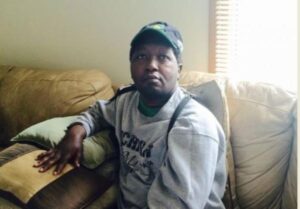 Thursday was Pius Koskei’s birthday, but the date on the calendar — like the passage of years itself —seems to make little difference. A man in his 30s is supposed to be in the prime of his life. But Koskei has passed each of the last four birthdays with little ability to celebrate, even if there were reason to do so.
Thursday was Pius Koskei’s birthday, but the date on the calendar — like the passage of years itself —seems to make little difference. A man in his 30s is supposed to be in the prime of his life. But Koskei has passed each of the last four birthdays with little ability to celebrate, even if there were reason to do so.
He can say only one word at a time, typically yes or no. Accessing language is a problem but memory may be the bigger one, which in some ways is also a blessing. He remembers nothing about the bullet that lodged itself in his forehead on Oct. 9, 2010, leaving him severely brain damaged. He lay in a coma for three weeks, and couldn’t walk for three months. Part of his scalp had to be removed and replaced with an artificial one — which also required replacement when infection set in.
Today he limps, and his right arm hangs idly if not secured in a sling. He gets headaches and seizures. On Monday, 13 years after he embarked on his American dream, he will have to abandon it. Unable to work, study or even afford his medications, he will accompany his mother home to the Kenyan farming village he left.
“He just came from Africa to escape poverty, and now he’s in poverty again,” said his younger sister, Sally Asui, who arrived in 2007 and has studied with his support.
This is one man’s immigration story, one of initiative against incapacitation, and of the domino effect of a random instant in the wrong place, knocking down everything you carefully built.
Koskei chose Des Moines because Kenyan friends had settled here. He arrived on a student visa and earned an associate’s degree in accounting at Des Moines Area Community College, followed by a bachelor’s at Upper Iowa University. When the shooting happened, he was enrolled in an online master’s program through University of Phoenix while working part time.
“Were it not for the accident, he would have been one of the very few Kenyans with master’s degrees in Des Moines,” said his brother-in-law John Soi, a nurse, who knew Koskei before the accident and later married his sister. I met Soi during the 2013 World Food Prize events where he had been an intern and helped gather local Kenyans together to honor that year’s prize recipient, Kenyan Charity Mutegi.
“He was a very jovial and outgoing person,” said Soi of Koskei. “He was very hardworking.”
It happened in the early morning hours. Koskei, who was living with his sister on Fleur Drive, had called to say he was heading home from downtown. She thinks he made a wrong turn and landed on 21st Street north of Drake Park. Police believe it was a stray bullet. No arrests were ever made.
There are upwards of 500 Kenyans in the Des Moines area, according to Koskei’s sister. As U.S. cities go, Des Moines does not rank as a high-crime one that foreigners would be cautioned to avoid. Yet incredibly, two Kenyans have been debilitated by violent crimes here in recent years. A 2013 carjacking left Mike Wasike, a credit analyst for Wells Fargo, unable to see, walk, talk or feed himself after being struck in the head with a gun. He was moved to a treatment facility in Oklahoma, and three teen-agers were sentenced to lengthy prison terms in connection with it.
In both cases, the crime victims couldn’t access government help like Medicaid or Social Security disability for their care because they are not U.S. citizens — even though both have valid visas and Wasike’s wife is a citizen. Koskei has no health insurance. He has been living on a U-Visa, which allows crime victims to stay and help in the investigation and prosecution of their attackers. So he has depended on his sister, who works part time and had to cut her education short. She also had to move to a place big enough for their parents to come to help out. She said there was nominal help from the Crime Victim Assistance Program at first and they are very grateful to Mercy Hospital for writing off some $400,000 in hospital bills.
“Caring for him has been a challenge,” Soi said. “He can’t stay without medications and someone has to be around 24/7.” He said Koskei is still jovial. I asked Koskei if he ever wonders, “Why me?”
“Yeah,” he said deliberatively. When I asked where he finds his strength, he answered, “God.” The family is Catholic.
Doctors don’t really know what to expect. “He can wake up one day and be just like that,” said Asui snapping her fingers, indicating back to normal “But it depends on how someone’s body heals themselves.”
But living this way is unsustainable. So, escorted by his mother and brother-in-law, Koskei will travel back to Kenya, where he hasn’t visited since leaving. Where his family raises tea and cows in the Rift Valley. Where medical care is cheaper, if you can get the medicines or reach the hospital, especially when it rains and roads are impassable. Where 13 years ago, parents saw a son off to seek his American fortune, never imagining fate would deal them such a bad hand.
To help
A public farewell party will be held for Koskei Saturday at 3 p.m. at Campbell Park, 12385 Woodland Ave., Clive. Donations will be accepted and can also be made at Wells Fargo in Koskei’s account No. 8917445168, or athttp://www.gofundme.com/u53czc.
-demoinesregister.com









